Are you weighing Shopware vs Shopify to figure out which eCommerce platform suits you better? Congratulations, you have come to the right place!
In this article, LitExtension will help you have a better understanding of these two popular eCommerce platforms. Here is our agenda today:
- Shopify vs Shopware Overview
- Detailed comparison of Shopware vs Shopify
- Shopware and Shopify: Which one should you choose?
Let’s dive right in!
What Is Shopware vs Shopify?
Shopware and Shopify have different approaches to supporting the building of an eCommerce site tailored to specific business needs.
Shopware is an open-source platform popular for its comprehensive feature set and flexibility. Though Shopware requires you to manage your hosting and technical setup, it gives you the freedom to modify, extend, and customize the software to your needs.
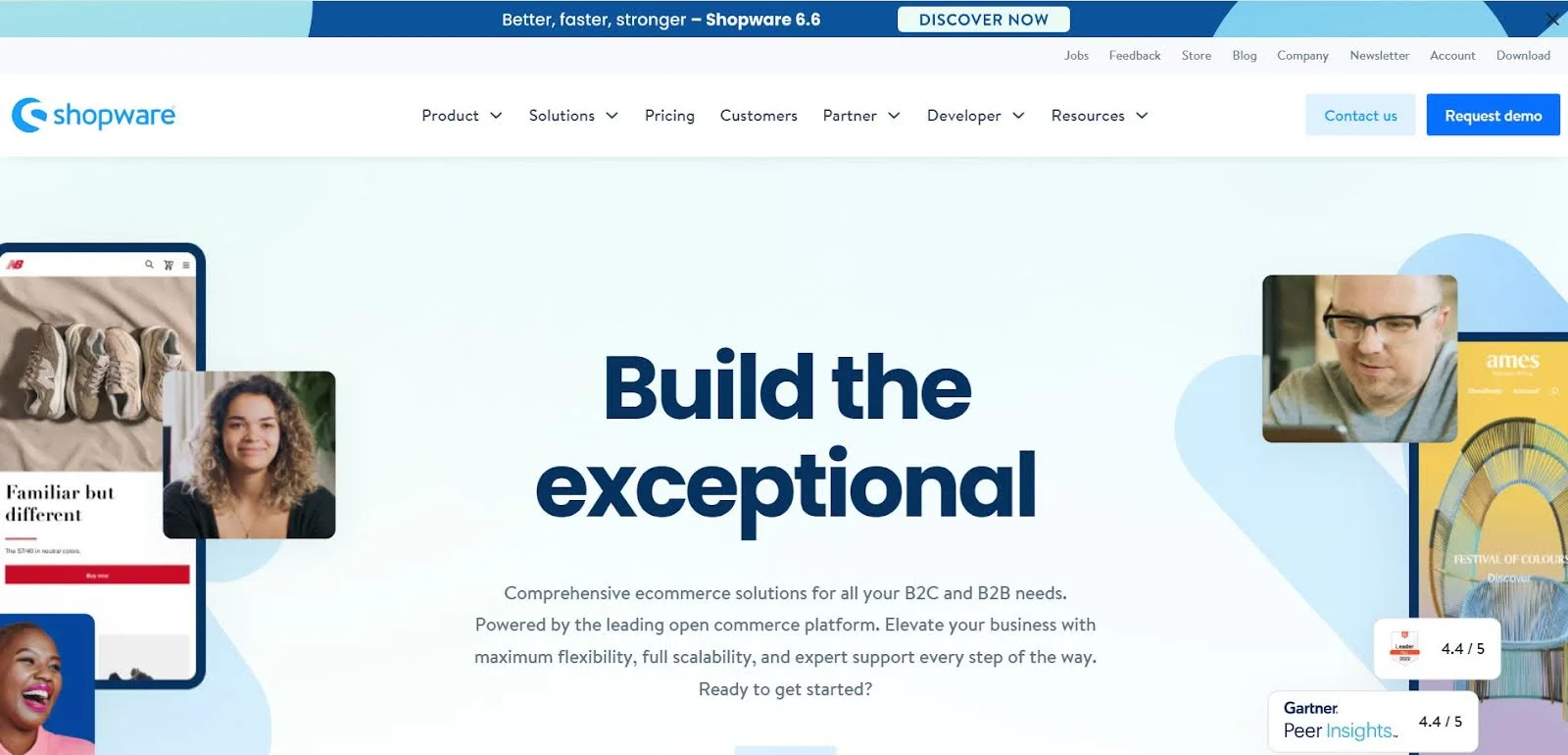
Unlike Shopware, Shopify is a hosted eCommerce platform. You pay a subscription fee (monthly or annually) to launch and manage your e-shop on Shopify’s server. Meaning? This platform takes the heavy-lifting parts off your plate that includes hosting and technical setup.

Shopware vs Shopify Detailed Comparison
Shopware | Shopify | |
Ease of Use 🥇 Shopify wins | The initial setup can be technically challenging and time-consuming. | Setting up and managing an online store feels like a breeze. |
Pricing 🥇 Shopify wins | Starts at $600/month | Starts from $5 to 2,500+/month |
Theme & Customization 🥇 Shopware wins |
|
|
Sales Features 🥇 It's a tie |
|
|
SEO & Marketing Features 🥇 Shopware wins |
|
|
App Integration 🥇 Shopify wins | 8,000+ apps | 2,900+ apps |
Security 🥇 Shopify wins | PCI DSS, HTTPS, 2FA | SSL Certificates, Fraud Analysis, 24/7 Security Monitoring |
Ease of Use
You won’t want the technical hassles to hold you back from scaling your store. Hence, let’s first compare Shopware eCommerce vs Shopify regarding ease of use.
As an open-source platform, Shopware is free and flexible. However, this comes at a cost, Shopware initial setup can be technically challenging and time-consuming. You will have to download and install Shopware source code on a Unix-based operating system.
After successfully installing Shopware, Shopware gives you an admin dashboard using the Vue.js framework. Again, to navigate around and set up your eCommerce website with Shopware, you need to be familiar with HTML, CSS, and JavaScript.
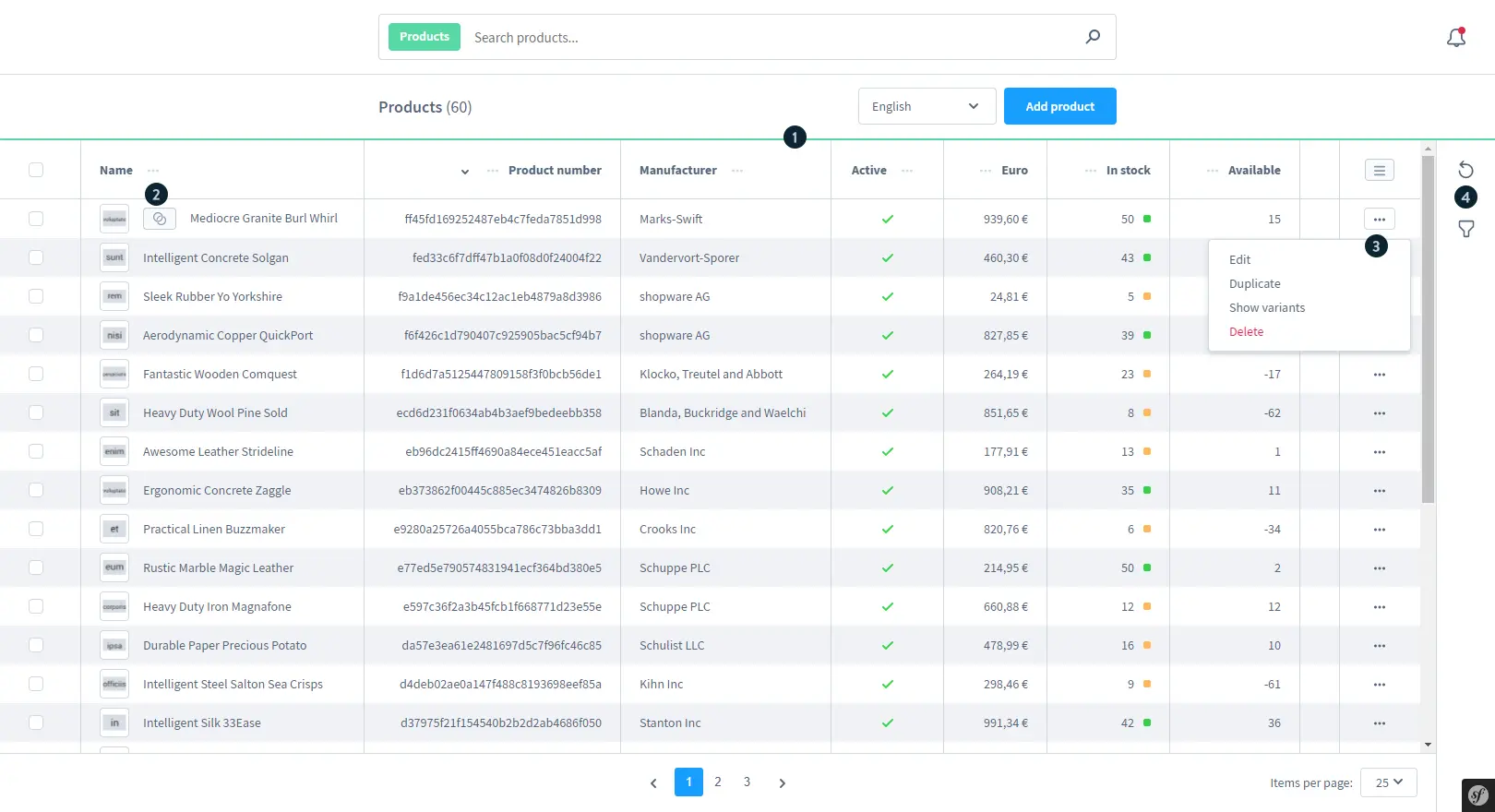
Meanwhile, setting up and managing an online store feels like a breeze with Shopify. After signing up for a Shopify account, you instantly unlock access to an admin dashboard. This is where you can easily launch and scale up your store using Shopify’s powerful toolkit.
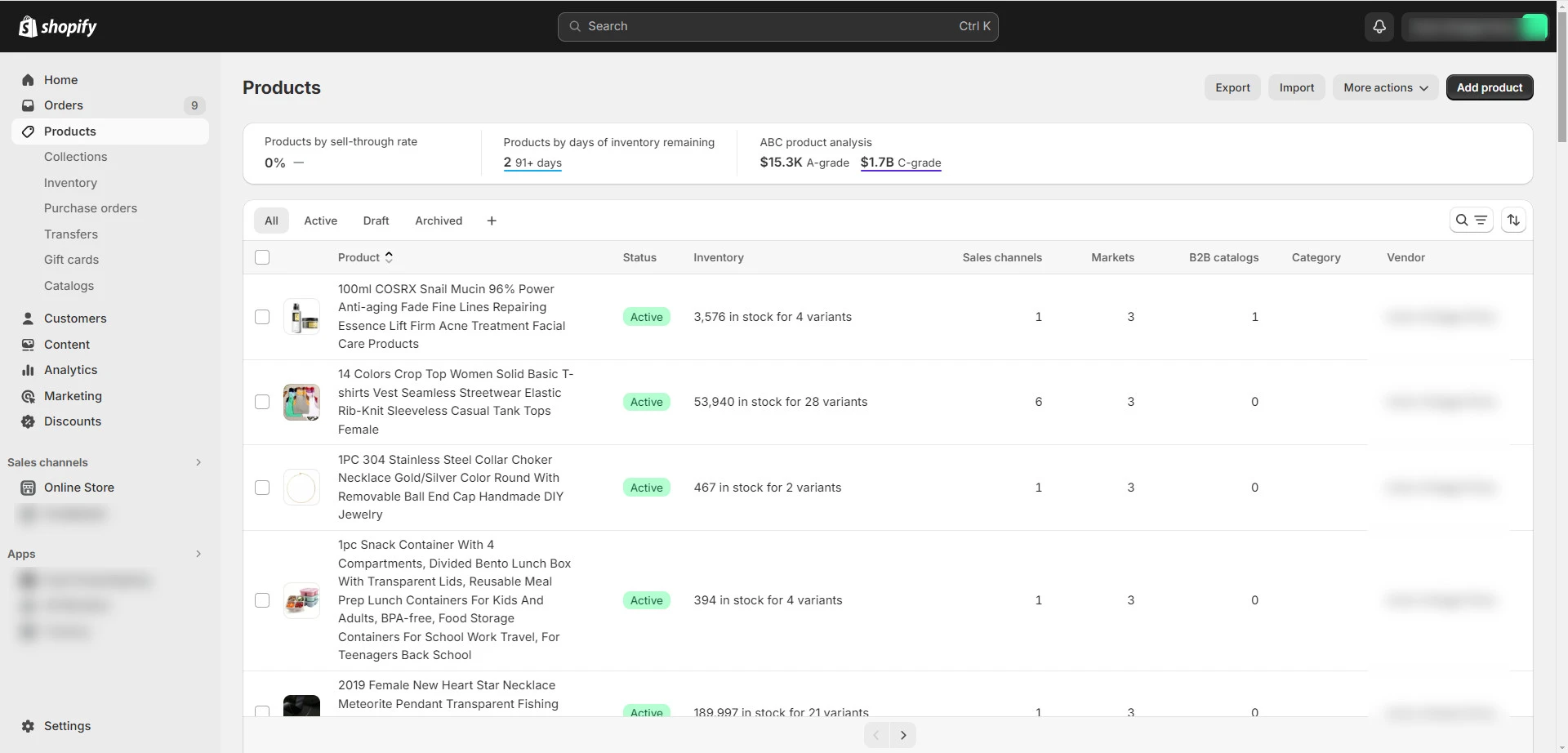
From our experience, even when you haven’t built a website before, you can do it easily with Shopify. This ranges from adding products and config shipping rates to localizing your store and running automated marketing campaigns.
💡 Final verdict: Shopify wins.
Shopware requires technical skills to launch and set up your web store. Meanwhile, anyone can set up a functional eCommerce website with Shopify’s intuitive dashboard.
Sales Features
It would be a huge mistake to leave sales features out of this Shopware vs Shopify comparison.
As one of the top-tier Shopify competitors, Shopware offers various advanced sales features. One notable eCommerce functionality of Shopware is Dynamic Product Group, which allows you to group your products in real-time using pre-defined conditions.
Let me give you an example. Suppose that you want to create a Dynamic Product Group for a “Summer Sale” category that includes all T-shirts under $20. Shopware would auto-find all T-shirts priced under $20 and list them in the “Summer Sale” category.
Shopware’s Rule Builder even lets you customize your store to different groups. For example, you could offer free shipping for orders over a certain amount or restrict certain payment methods to specific customer segments.
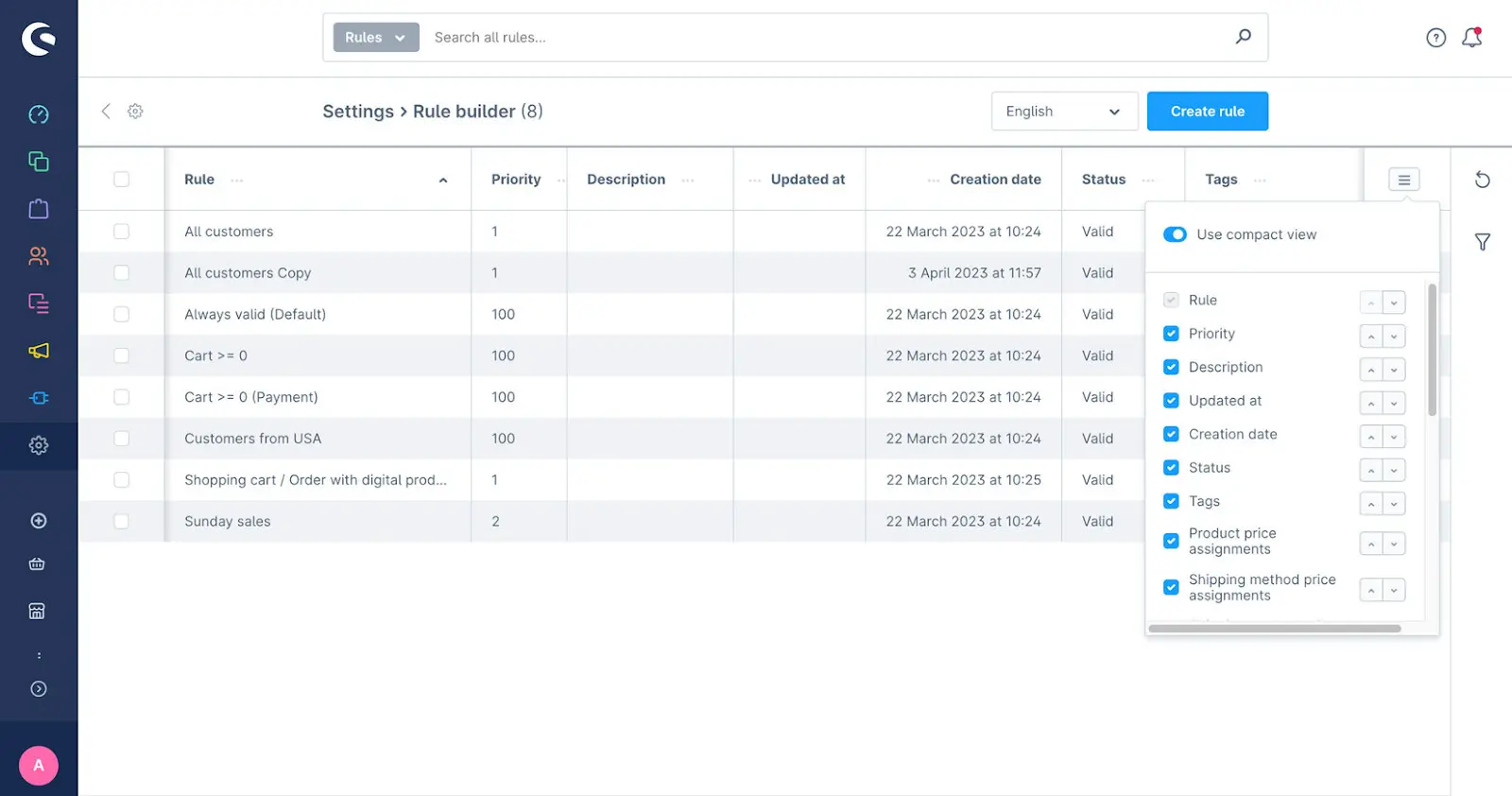
When it comes to accepting online payments, Shopware supports 70+ payment methods and doesn’t charge extra transaction fees.
Regarding Shopify, the platform syncs inventory data across multiple channels (including Shopify POS) so you can manage your sales in one place. Plus, you can even localize your store’s languages, currencies, pricing, etc., using Shopify Markets.
What I like most about Shopify is its ecosystem of sales features. For instance, Shopify Shipping partners with major carriers to give you discounted shipping rates. Or, with Shopify Fulfilment Network, you can automate your store’s fulfillment process.
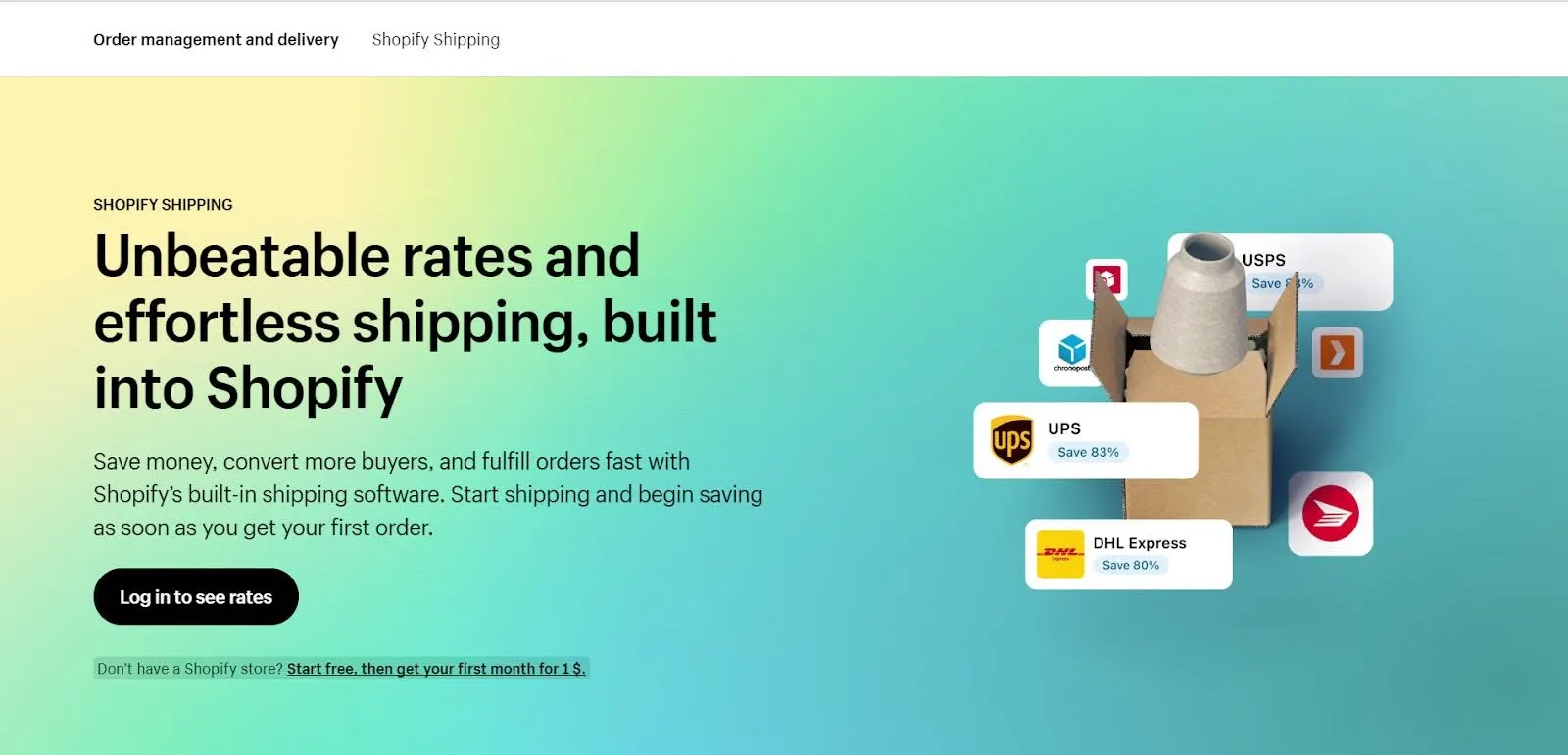
Shopify also impresses us when it supports 100+ payment providers. However, be well noted that if you don’t use Shopify Payments, Shopify charges you an extra transaction fee from 0.5% to 2%, depending on your pricing plan.
💡 Final verdict: It’s a tough tie.
Shopware is powered by advanced automation, while Shopify is fueled by its extensive in-house sales ecosystem and extensive supported payment methods.
Pricing
If you are on a tight budget, finding a platform with affordable pricing is important. Hence, let’s explore how much do Shopware vs Shopify cost to build an eCommerce website.
Shopware has two versions: a free community edition and a SaaS edition. The community edition can be downloaded and installed on your system. However, with this version, you’ll have to pay the hosting cost and SSL certificate and take care of the initial setup yourself or hire someone to do so.
The second version is pricing for SaaS packages: Rise, Evolve, and Beyond.
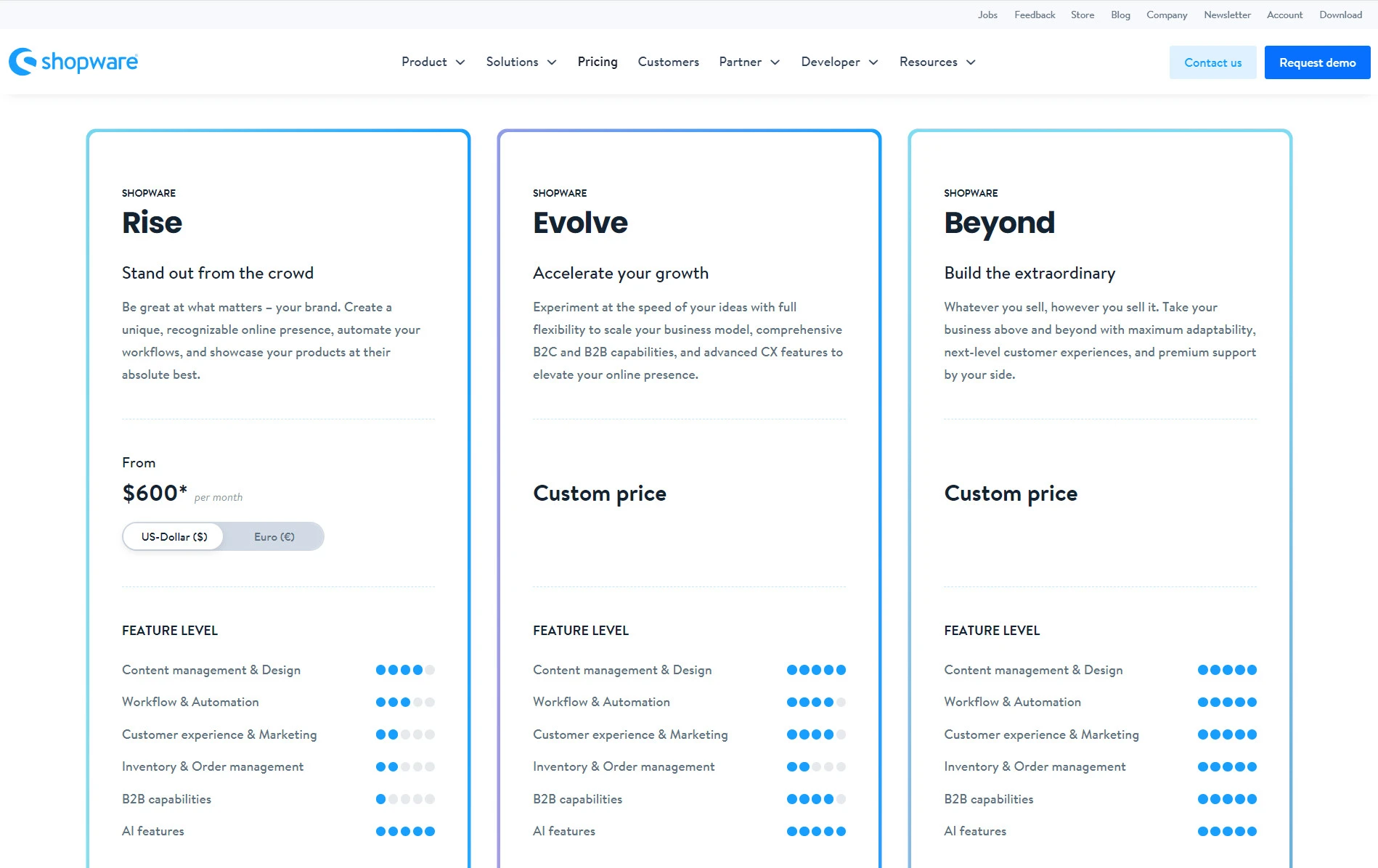
Beyond’s pricing starts at $600/month. To get the two custom plans, Evolve and Beyond, you’ll have to schedule a call with Shopware’s sales rep.
On the other hand, Shopify’s pricing plans are quite transparent and affordable. Shopify has 5 pricing packages that can fit well stores of all shapes and sizes:
- Starter at $5 per month (*Note: with Starter, you don’t have an eCommerce website)
- Basic Shopify at $39 per month
- Shopify at $105 per month
- Advanced Shopify at $399 per month
- Shopify Plus (custom plan) starts from $2,300 per month for a 3-year contract
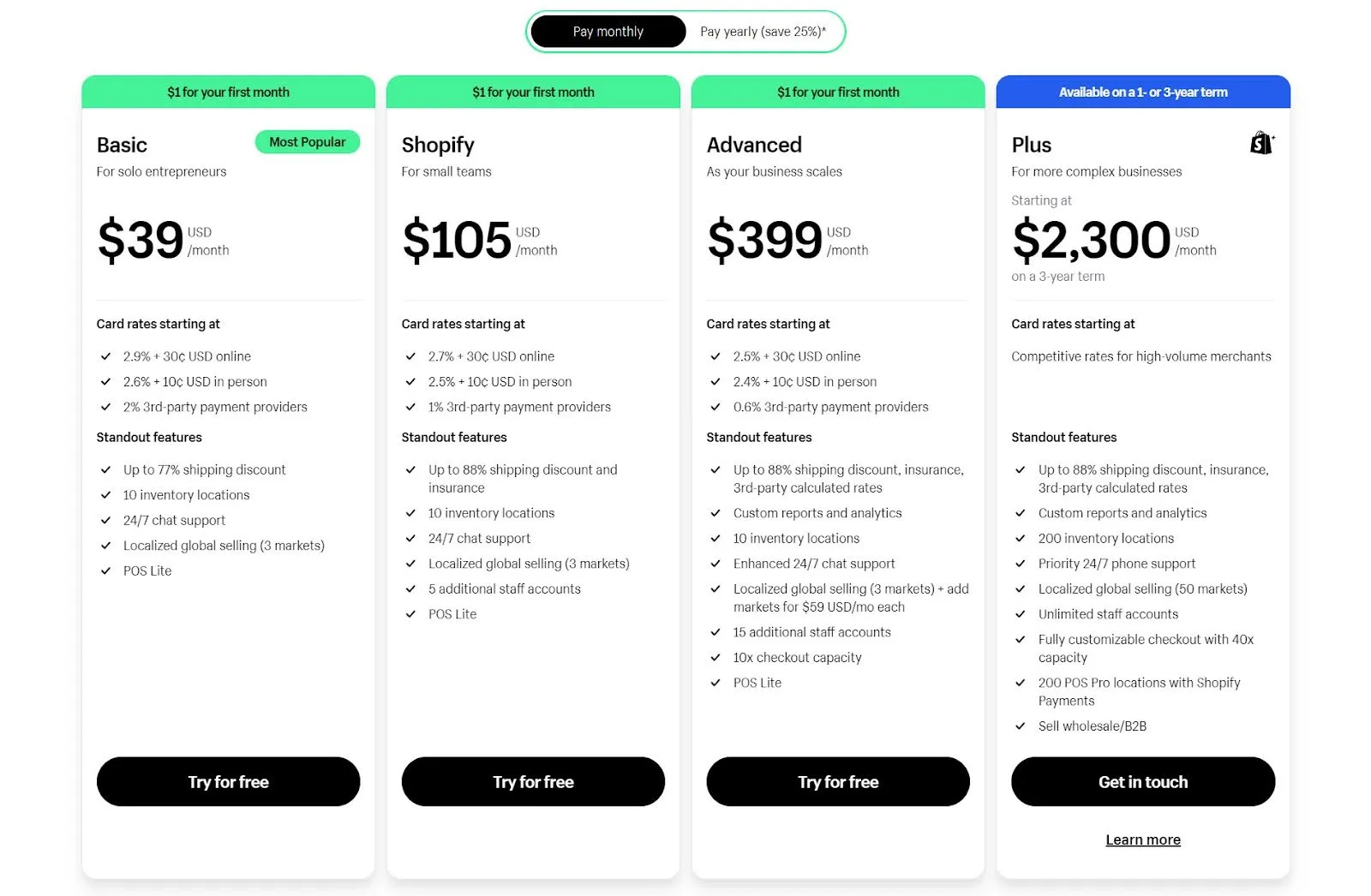
Clearly, as one of the biggest Shopware competitors, Shopify’s pricing plans are much more affordable.
However, this doesn’t mean Shopify offers fewer eCommerce features than Shopware. Even for the lowest plan, Shopify allows users to add unlimited products, manage stock levels across multiple channels, etc.
💡 Final verdict: Shopify is more affordable than Shopware.
It’s obvious. Shopify's lowest website builder solution costs only $39/month, while Shopware's starts at $600.
You may argue that Shopware has a free community edition. But still, the costs of hosting, deployment, customization and expert outsourcing are still higher than Shopify.
Theme & Customization
Let’s continue our Shopware vs Shopify comparison in another important aspect: theme and design customization.
Shopify | Shopware | |
Number of website templates |
|
|
Level of customization |
|
|
💡Final verdict: Shopware overshadows Shopify in this round with advanced customization options.
Shopware’s online shop has 160 themes, which is less than Shopify in number. However, while Shopify charges a one-time fee, Shopware themes are more expensive and have a recurring subscription model.
Both platforms offer ample customization options. However, Shopware is more customizable thanks to its open-source nature.
SEO & Marketing Features
Proper SEO and marketing features are essential to promoting your store efficiently. Hence, it’s important to examine each platform's features.
Shopware | Shopify | |
SEO |
|
|
Marketing |
|
|
💡 Final verdict: Shopware has better SEO and marketing features.
For SEO, Shopware offers more advanced configurations. Regarding marketing, Shopware also slightly edges over Shopify with more native marketing functionalities.
App Integration
Shopware and Shopify are both one-of-a-kind eCommerce platforms. However, you’d surely need to use apps to add custom features that the 2 platforms don’t offer natively.
Shopware Extension store is extensive and covers various features. With 2,900+ extensions, you can add a shipping app, landing page builder, B2B extension, etc, to enhance your store’s functionality.
Meanwhile, Shopify App Store has up to 8,000+ apps covering a wide range of functions, from product sourcing tools and email marketing to upsell, SEO, and more. Clearly, the Shopify App Store is ahead of the Shopware Extension Store regarding the number of third-party tools.
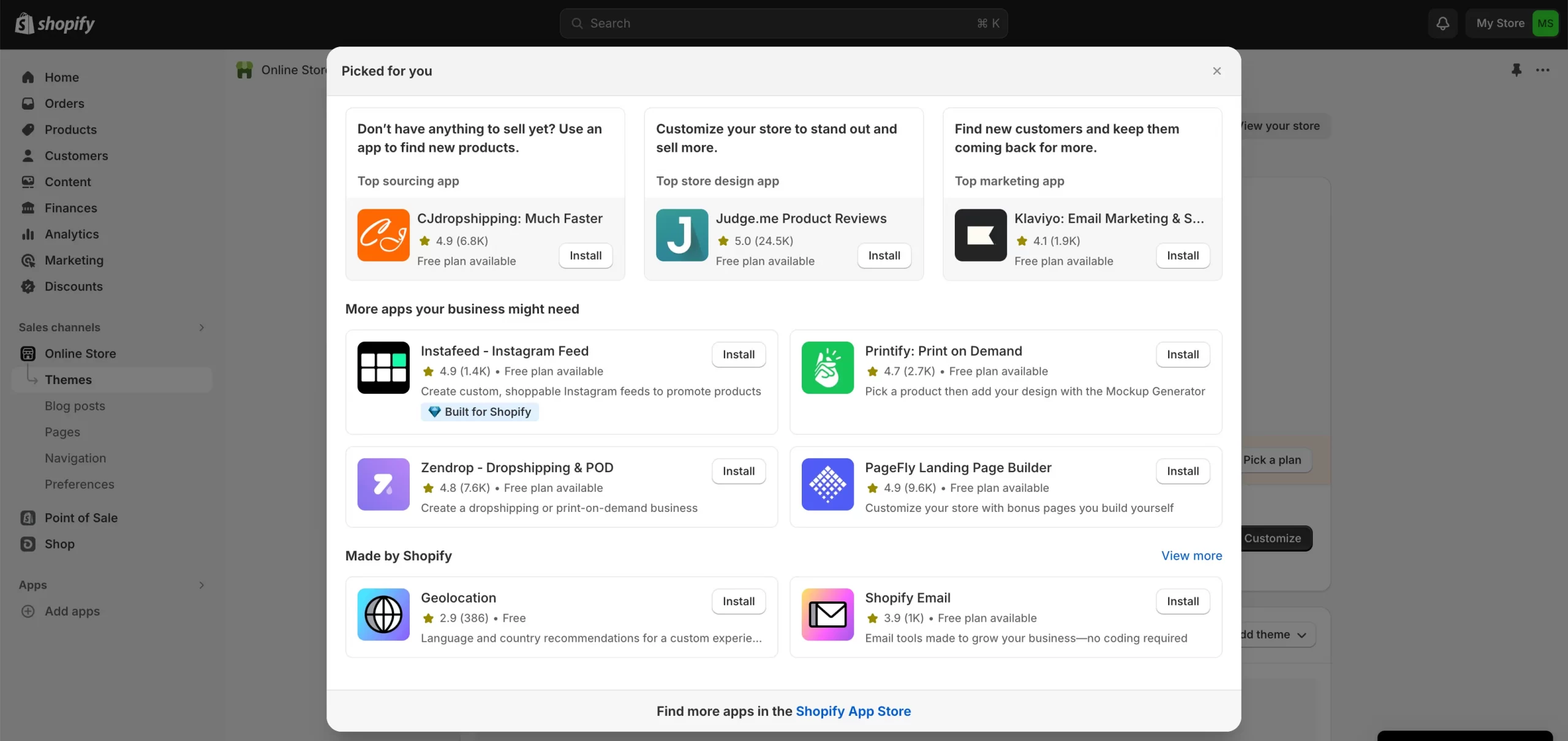
One of the things I love about Shopify is that the platform suggests the right apps for me based on the information I provide during registration.
💡 Final verdict: Shopify defeats Shopware in number.
Both Shopware and Shopify have an impressive number of apps and extensions. However, Shopify App Store has over 8,000 apps—much higher than Shopware's 2,900.
Security
I understand that security is a major concern for any eCommerce platform because it directly impacts your customers' trust and the safety of their sensitive data. Let's compare and analyze the security features of Shopware and Shopify.
Both Shopware and Shopify provide strong security features such as PCI DSS, SSL Certificates, and Two-Factor Authentication (2FA) to protect customer data and ensure a secure online environment. They prioritize security certifications, regular updates, encryption, and monitoring to guarantee a safe shopping experience.
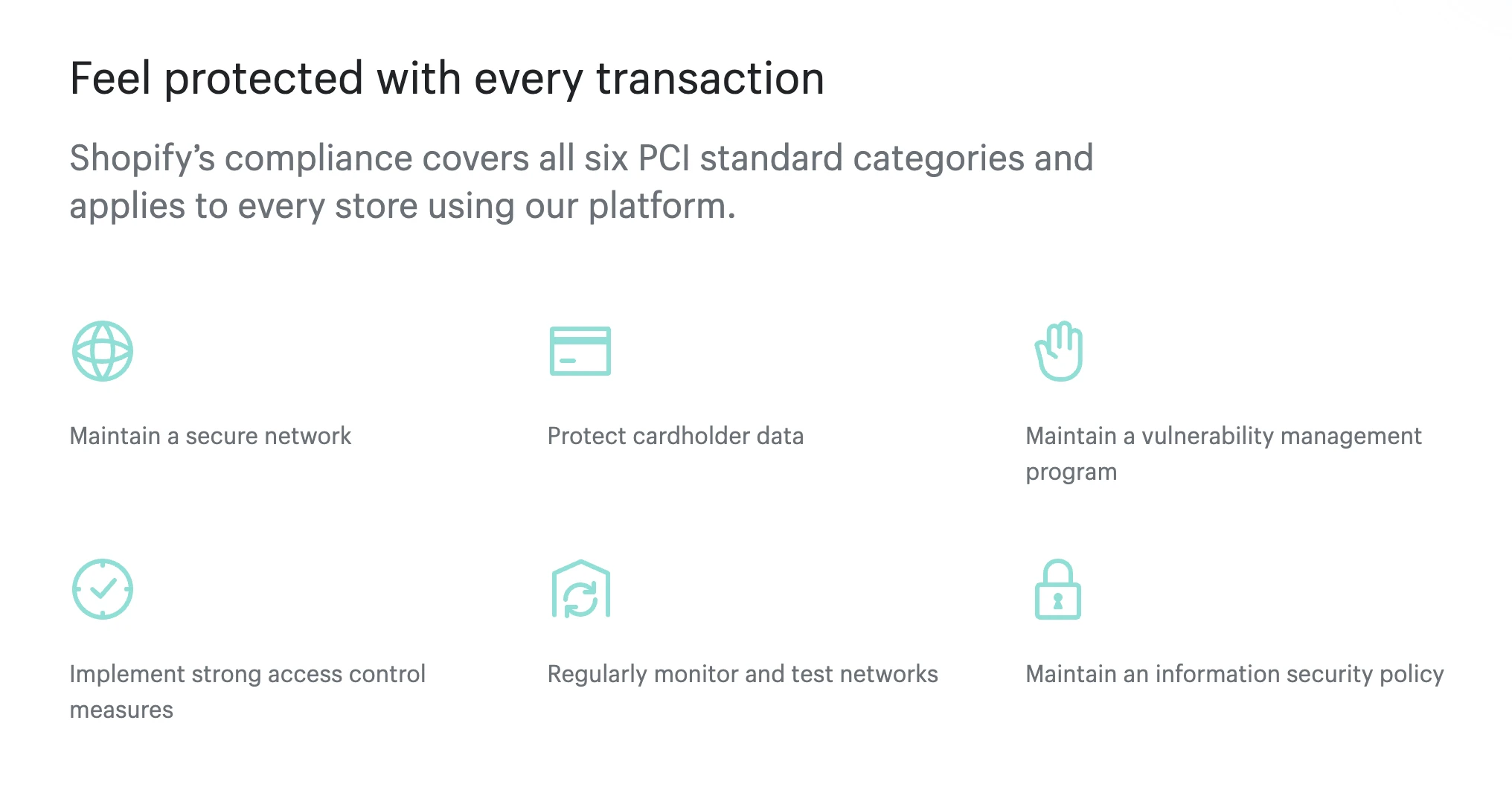
However, there are differences due to their open-source and hosted nature. Shopware's open-source platform allows for greater transparency and community involvement in security, while Shopify's closed-source platform relies on its internal security team.
Ultimately, both platforms are committed to protecting your online store and customer data. If you're looking for comprehensive security features and automatic updates, especially if you don't have extensive technical resources, I empathize with your decision to choose Shopify.
💡 Final verdict: Shopify defeats Shopware with comprehensive and automatic security measures.
Which eCommerce Platform Should You Use – Shopware vs Shopify?
We've thoroughly compared Shopify and Shopware. Now, let's summarize the pros and cons to determine the best fit for each business.
Shopware | Shopify | |
Pros | + Flexible customization options | + Transparent and competitive pricing |
Cons | - The SaaS editions are expensive | - Less customizable without coding |
Best for | Large-scale businesses looking for a customizable and scalable eCommerce solution. | Business of all sizes looking for an all-in-one, user-friendly eCommerce platform with global reach. |
♦ Here are a few comparison articles like this that you might be interested in:
- Shopify vs GoDaddy: Which Wins the Crown?
- Magento vs Shopify Comparison: Which One is The Ultimate Choice?
Frequently Asked Questions
No, it is not. While Shopware is an open-source platform known for its flexibility, Shopify is a hosted solution famous for its ease of use and affordable pricing plans.
Shopware is used to build online stores, particularly for businesses that need high flexibility and customization.
It depends on your needs. Shopware is better for those who need flexibility and customization, while Shopify is better for those who prioritize ease of use.
No, Shop and Shopify are not the same.
- Shopify is an eCommerce platform that allows merchants to create and manage online stores.
- Shop, on the other hand, is an app created by Shopify that helps customers track their online orders and discover new Shopify stores.
Conclusion
All in all, Shopware and Shopify are both fantastic eCommerce platforms for launching and managing your store. LitExtension hope that after reading this comparison between Shopware vs Shopify, you can choose the one that best suits you.
Don’t forget to dive into eCommerce Platform section and join our active Facebook Community for all things eCommerce.

